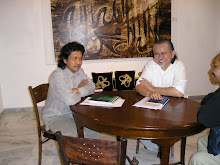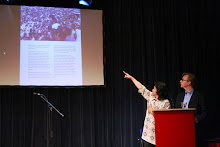By Emha Ainun Nadjib
Cultural observer, writer and artist, Indonesia
GATRA Number 15 Monday February 20th, 2006.
The global shockwave initiated by the Jyllands-Posten caricatures may last longer, range further and go deeper than we can imagine, analyse or calculate. This is more than just a ''pop song'' about Islamophobia, the cause of democracy and hegemony or the interpretation of what constitutes the term terrorism.
Perhaps it’s also about more than just the rate of the dollar against the Euro, more than the global designs upon the earth which revolve around a certain ‘turn of a card’ alongside the other cards which have been played in their turn since glasnost and perestroika, which ''democratised'' the Soviet Union, and then Afghanistan, Iraq, and the clouds building in the skies over Syria and Iran, and then also Indonesia: whose choice of cards is entirely different.
More than the simple happenings of politics, ideology and culture: it could be that the time scale of the background to those caricatures is a very long one. Denmark is not Britain, which has the experience of a long association with Islam over long centuries. Denmark is a part of Scandinavia, which sets great store by the maturity of the democracy that it has achieved. One of the ‘sacred verses’ of democracy is the freedom of expression, which in particular manifests itself in the freedom of the press. This is held in such high regard that it is unimaginable that religion, prophethood, a holy book or God could command a high level of respect.
And the peak of the beauty of that freedom of expression, if someone must compose a sentence, arrange a song, scratch out a painting or draw a caricature, - then the prime theme, in a situation where the world appears to face the apocalypse, troubled by terrorism, and that too identified with Islam – is nothing other than the expression of irritation, annoyance, maybe even hatred of Islam. "For the sake of freedom of expression," wrote the Jyllands-Posten, but "the only thing expressed by the cartoons, however, was contempt for Muslims."
Spittle
In one situation of war, the nephew of the prophet Muhammad PBUH, namely Ali ibn Abi Thalib – who aside from being a theologian, a spiritualist, a cultural observer, an expert on social strategy, a man who was able to defend himself and who could not be defeated in swordplay, a scientist whom it was agreed by all clerics had attained the ‘peak of learning’ – was able to defeat his opponents.
Ali was able to strike the sword of his opponent so that it was torn from his grasp, and he would then cause his opponent to fall to the ground only to find the tip of Ali’s sword point at his throat. He had only to push, and that did not violate any human rights nor could it be considered violence, in the same way that the deaths of thousands of Dutch soldiers in Indonesia were also not attributable to their having fallen victim to the violent movement of the nation of Indonesia. However, Ali’s opponent suddenly spat in his face. Ali was shocked, wiped away the spittle from his face, was quiet for a moment, then withdrew his sword and moved away, leaving the opponent who he could so easily have killed with just a small movement. Of course, he was asked why he had walked away and had not killed his opponent, who had spat in his face. Ali answered: "Because I was spat upon, a feeling of anger and hate arose in my heart towards him. Because of that I left him, fearing God’s anger towards me if I had killed an opponent out of anger and hate."
There is no further need to exhibit the wisdom, the patience of the soul, or the purity of the values inherent in Ali’s deed, because every person, in the personal history of each, has been endowed by God with mind, intelligence, spirituality and sense of values. But it may be useful to know that Ali was the nephew of a man who, whenever forced to take up arms, would always devise a strategy that prioritised minimal casualties for both sides, to the extent that, of all the battles in which Muhammad PBUH fought, the fallen numbered less than 500 in total.
If You Forgive
There was one man named Abdullah ibn Ubay, who every day, yes really, every day, would mock Muhammad PBUH, ridicule, abuse and insult him. That lasted the entire life of Muhammad PBUH.
In response, let’s make it into a competition: whoever can identify where one word of irritation or rudeness was used by Muhammad PBUH, not to mention any manifestation of anger or the use of violence – you can seek it in any history or in any book of Hadiths (traditions or sayings of Muhammad PBUH), - we’ll all club together for a prize to give the one who can find even one example. There was not one bad word said from the lips of Muhammad PBUH in response to the man from the village of Thaif who chased him away and pelted him with stones until he bled.
Allah himself gives a clear moral response to the person who has been insulted or abused. The person has a judicial right to do the same act, but no more than that. Then, the ‘right’ is enclosed with the beauty of the phrase that: "If you can forgive him, it would be better in My eyes."
Muhammad PBUH was an ordinary man (he refused to be made a ‘Prophet-King’, and chose, though a prophet, to be considered nothing more than an ordinary man) who was made to suffer during his life, after his death, and has even been made to suffer in the centuries since then. Insult and public misunderstanding have been the main items on the menu. His house measured 4.80m long by 4.62m wide. Allah would not allow him to have a boy-child, with the exception of Qosim, who was called back to Him, passing away while still an infant. His nephew was murdered, both grandsons too. His first grandson was poisoned by his own wife, became aware of it, forgave her and then the next morning was poisoned again and died. His second grandson was murdered but his head was torn from his body and borne away on horseback for hundreds of kilometers, causing him to be buried in two places.
Muhammad PBUH loved barbecued goat, especially the left foreleg. And it was one such left foreleg that was grilled by Zaenab, a Jewish woman, coated in poison, and given to him. Muhammad PBUH fell into a deep fever on account of that, and he was treated initially in the house of Maimunah, and then he asked to be taken to the house of Aisyah. This was because Maimunah still had her own family, and those who were not family were not free to visit him. By moving to Aisyah’s house, all parties, sides, factions and other religious representations had the opportunity to visit him.
The Taste of Misery
This was a man who sewed his own clothes and repaired his own shoes, a man who as long as he lived never ate his fill for as long as three successive days and who always had days of hunger. His wife could never for even as long as just a week, cause him to eat well, without there being long periods where there was nothing to put on the table in their house.
If at night, having said his late evening prayers (salat tahajud) for too long in the mosque, and arriving home late, this softly-spoken husband, who walked with his face held down, would not wish to wake his sleeping wife but would sleep in the wooden door frame at the front of the house.
Of course, not all the depictions of Muhammad PBUH are ones that have to do with melancholy and torment. But the insults which have followed him through history could possibly not have been borne by any other. One peak of the misery experienced by Muhammad PBUH is found in one of his sayings, filled with a deep and prescient mourning: "Al-Islamu mahjubun bil-Muslimin." Islam is obscured by Muslims. Whether it be a little, or much, whether many or too much – Muslims fail not only do not represent Islam; they do more than that; they obscure or conceal Islam. To obscure is to conceal, to negate.
On thousands of occasions I have been involved in forums among the masses, public forums and forums of Muslims, and the most beautiful of all those forums is that which is entitled "Plucking (as if flowers or fruit) the Torments of the Prophet of Allah".
A number of my companions have asked me, was I not upset or angry at the caricatures in Denmark? I give a cheerful reply: with all insults and abuses I love the Prophet of Allah Muhammad PBUH. He was a man who was the most beloved of Allah and who loved Allah more than any. How could there be one molecule of my living being that was not filled with love for him? The extent of my capacity of love for him brings me to a state of intoxication, experiencing giddier heights than ever reached before, hunched up in corners so tight I could not possibly be more restricted, love that is greater than even more than life or death itself.
All insults, irritations, abuses and faults, as brutal as they can possibly be, could not decrease the extent of my capacity for love even 1 cc. Love for the Prophet fills my soul and my life, and my love for family, friends, country and nation, for the entire community: becomes more beautiful, more filled with brightness and filled with peace, in the womb of my love for him. Whatever the potency of any insult, it cannot compare to the absolute certainty of death, while my love for him rides above life and death. And if the prophet was never angry, if he was kind and always forgave those who insulted him: how could a person who loves the Prophet of Allah dare to offer anything but kindness and forgiveness?
Also, Allah’s gift via Muhammad PBUH, that was called Islam, gives me great insight, clarity of thought, strength and calm – which could not be reduced by any kind of insult. Islam offers a sense of protection and support. Islam itself does not need me, but I need Islam. Even, if I can be very frank, all forms of harm of that nature have no more effect than to widen the smile of my face for Islam while increasing my love for Muhammad PBUH. Those insults even serve to raise him higher in his heaven.
And something else about our friends, the Danes: have you not studied their history, their ways of thought, their experiences: yet you are shocked by their modes of expression? Based on what expression of ‘Danish-ness’ and with what perspective on reality would you expect anything but caricatures like those? Why would you a chicken to bleat or a goat to crow?
As for those Muslims who are angry, enraged, riotous: why are you surprised or expect that they would behave in any other way? Do you think they are Ali bin Abi Thalib? Based on what tradition of Islamic teaching or on the religious culture of what group of Muslims, or on what state of maturity, wisdom, and humanity do you regard their rage?
I would not spit in your face, because I’m not sure that you wouldn’t be angry too like that and perhaps your revenge would last the rest of your life. I would also not caricature your face like a monkey or a gecko, because the most upset would not only be you, but perhaps your family, your people, maybe even your country and nation. If I were to spit in your face because to do so was to demonstrate my freedom of expression, maybe you would also want to bash my head because to do so would also be to demonstrate your own freedom of expression.
Instead, we should draw pictures together that caricature love.
Sunday, 16 August 2009
Subscribe to:
Post Comments (Atom)


.jpg)





No comments:
Post a Comment